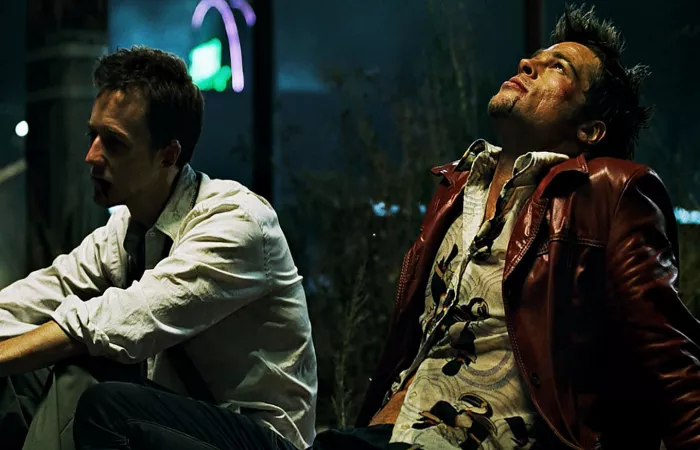David Fincher’s “Fight Club,” based on Chuck Palahniuk’s novel, concludes with a mind-bending twist that leaves audiences questioning the nature of reality and the protagonist’s journey. The film’s enigmatic ending has sparked intense debate and interpretation among viewers, prompting discussions about identity, perception, and existential philosophy. In this detailed explanation, we delve into the ending of “Fight Club” to unravel its complexities and hidden meanings.
Setting the Stage
To understand the ending of “Fight Club,” we must first revisit the journey of the protagonist, referred to as the narrator (played by Edward Norton). The narrator leads a mundane life characterized by insomnia, existential angst, and a yearning for purpose. He attends support groups for various afflictions to experience catharsis and emotional connection, revealing his deep sense of alienation and disillusionment.
The narrator’s life takes a dramatic turn when he encounters Tyler Durden (played by Brad Pitt), a charismatic soap salesman with a rebellious and anarchistic worldview. Together, they form an underground fight club as an outlet for male aggression and societal rebellion. However, as the narrative unfolds, the true nature of Tyler and the narrator’s relationship becomes increasingly ambiguous.
The Revelation: Tyler Durden’s True Identity
The climax of “Fight Club” culminates in a shocking revelation: Tyler Durden is not a separate individual but a projection of the narrator’s subconscious mind. Tyler represents the narrator’s repressed desires, impulses, and fears, manifesting as an alter ego that challenges the narrator’s complacency and conformity.
The revelation that Tyler is a figment of the narrator’s imagination reframes the entire narrative, inviting viewers to reassess earlier scenes and interactions from a new perspective. Tyler’s enigmatic charisma and confrontational approach now reflect the narrator’s internal struggle for self-actualization and liberation from societal constraints.
Unraveling the Twist Ending
The twist ending of “Fight Club” unfolds during a climactic sequence in which the narrator confronts Tyler and realizes their interconnectedness. As the narrator shoots himself in an attempt to erase Tyler from his psyche, he symbolically rejects his own self-destructive impulses and embraces a newfound sense of agency.
The film’s ambiguous conclusion leaves room for interpretation, as viewers grapple with existential questions about the nature of identity and consciousness. Has the narrator truly overcome his inner demons, or is he trapped in a perpetual cycle of self-deception?
Themes of Identity and Self-Discovery
At its core, the ending of “Fight Club” explores themes of identity and self-discovery. The narrator’s journey represents a quest for authenticity and personal agency amidst societal pressures and existential angst. By confronting Tyler as a manifestation of his own psyche, the narrator undergoes a transformative process of self-awareness and acceptance.
The film’s denouement suggests that true liberation comes from embracing one’s authentic self and rejecting external influences that stifle individuality. The narrator’s realization symbolizes a profound shift in consciousness, challenging viewers to reflect on their own struggles with identity and self-expression.
Existential Implications and Interpretations
The ending of “Fight Club” invites multiple interpretations and philosophical inquiries into the nature of reality and subjective experience. Some viewers interpret the film’s conclusion as a metaphor for psychological integration, with the narrator reconciling conflicting aspects of his personality.
Others view the ending as a commentary on societal conformity and the dangers of unchecked individualism. Tyler’s demise symbolizes the narrator’s rejection of destructive impulses and the pursuit of inner harmony.
Conclusion: The Legacy of “Fight Club’s” Ending
In conclusion, the ending of “Fight Club” is a thought-provoking conclusion to a narrative that challenges conventional storytelling conventions. David Fincher’s direction and Chuck Palahniuk’s narrative craftsmanship create a compelling exploration of identity, rebellion, and existential crisis.
The twist ending of “Fight Club” continues to captivate audiences and inspire debates about the nature of selfhood and consciousness. As viewers revisit the film, they uncover new layers of meaning and hidden symbolism embedded in its narrative fabric.
Ultimately, the ending of “Fight Club” serves as a testament to the enduring power of cinema to provoke introspection and philosophical inquiry. By unraveling the complexities of the narrator’s journey, the film leaves an indelible mark on popular culture and invites viewers to confront uncomfortable truths about the human condition.
Related Topics:
5 Secrets About “Fight Club” That Only Superfans Know
Why Brad Pitt’s Style in “Fight Club” Still Packs a Punch 20 Years Later
Exploring the Main Points of “Fight Club”

